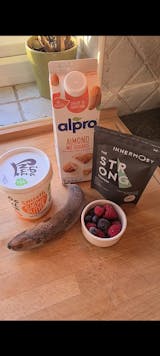If you’re anything like us here at Innermost, and you’re into your skincare, have a social media account of any kind, or have gone anywhere near Reddit recently, you’ve probably heard of the term slugging at some point.
Whilst this isn’t the most attractive of names for a skincare strategy, granted, if it works, it works. Saying that, though, there have been mixed reviews – and that’s what this article is here to get to the bottom of.
You know us, we’re always ready and waiting to bust the myths around the latest health and wellness fads, and when it comes to skincare, our interests are no different.
What is slugging?
On the off chance that you haven’t heard what slugging is, don’t worry, we’ve got you. The latest in slugging skincare on Reddit describes a strategy which involves one ingredient and one ingredient only: petroleum jelly. Or, as it’s probably more commonly known by its very popular brand name: Vaseline.
Following your regular, day-to-day skincare routine (you know, cleanse, tone, moisturise, The Glow Booster), take good old-fashioned petroleum jelly and apply this to a particularly problematic area of your skin.
What is the point of slugging skincare?
The new slugging skincare technique is primarily aimed at those with dry skin. Essentially, the point of slugging is to enhance your skin’s natural barrier, whilst simultaneously locking in the products that you’ve previously applied to your skin in your skincare routine.
This gives your skin an extra layer of protection against potential bacteria, whilst giving your products their chance to work their magic.
Intended to be a technique implemented overnight, slugging in skincare has been praised for its hydration benefits. But what other benefits does this new craze bring?
What are the main slugging benefits?
The reported slugging benefits are all to do with hydration, with the top reported benefits including the below:
- Increased hydration levels
- Overall improvement in skin appearance
- Enhanced glowing
- Bouncy, youthful skin
- Enhances the skin’s natural barrier
Are there any disadvantages to the slugging skincare hack?
As always, we like to bring the facts. We’re all about the science, after all. As a result, it’s only fair to give you both sides of the coin.
Reported disadvantages of the slugging skincare trend include:
- An increase in oil on the skin
- Topical breakouts
- It can make a right old mess
- Reported to trap dead skin
But… does Vaseline clog pores?
We know what you’re thinking.
Can I use Vaseline as a moisturiser on my face? Does Vaseline clog pores? Ummm…. Is Vaseline even good for your face?
All great, great questions. And this is where a lot of the controversy comes from surrounding this hot new slugging skincare technique.
Whilst many skincare blogs and fanatics claim that their pores haven’t been clogged through this technique, a lot of people have questioned the very nature of Vaseline and the ‘moisture locking’ technique that this ingredient promotes. Surely, if petroleum jelly locks moisture, it clogs pores?
Maybe not.
According to the official Vaseline website, Vaseline is what we call in the business call noncomedogenic, which means that no clogging (or blocking) of any kind will happen to your pores.
Again, everyone is different though, so if you’re experiencing outbreaks (or adverse reactions, for that matter) following slugging, it’s definitely best to put down the petroleum jelly and resume your normal skincare routine. Stat.
Here's how to slug
Like we always say, to each their own, and if you want to give slugging a try, here’s how. It’s worth noting that this slugging technique is primarily aimed at those with dry to very dry skin, so if you’re someone with combination skin, or oily skin too, definitely steer clear.
Here’s how to nail the slugging trend:
- Apply a very thin layer of petroleum jelly
- Apply topically only, not all over your face
- Apply at night for the best results
- Only apply after completing your regular skincare routine
- Don’t overdo it, once or twice a week is good enough
Summary
All in all, it looks like the slugging skincare trend. If you’re someone with particularly dry skin, it could be a good way to go, but if you’re more on the oily side – maybe steer clear of this.























